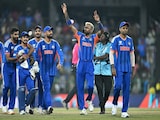Our heart is the facilitator of our bodies. Heart issues should not be ignored and can pose as a sneak peak into your future. There can be early signs of heart issues and they often appear subtly before becoming serious. These signs occur because the heart may not be pumping blood efficiently, leading to reduced oxygen supply to the body. Often, people dismiss these as minor or due to stress, but they can be warning signals that the heart is under strain and needs medical attention. Even in the 30s, early signs of heart issues can show up, especially with risk factors like stress, obesity, smoking, diabetes, or family history of heart disease. Since heart problems can develop silently at a younger age, it's important to take these small changes seriously and get regular health check-ups to prevent complications later. Read on as we share early signs of heart issues you need to look out for in your 30s.
Early signs of heart issues you need to look out for in your 30s
1. Chest discomfort or tightness
Even in your 30s, recurring chest pain, pressure, or tightness can be an early indicator of heart strain. It may not always be sharp pain, it can feel like heaviness or squeezing, often mistaken for acidity or muscle pain. If it worsens with activity and eases with rest, it may point toward angina or reduced blood flow to the heart.
2. Shortness of breath with minimal effort
If climbing stairs, brisk walking, or mild exertion leaves you unusually breathless, your heart may not be pumping blood efficiently. In younger adults, this is often ignored as low stamina, but persistent shortness of breath can suggest early heart dysfunction.
3. Fatigue that doesn't go away
Unexplained and persistent tiredness, even after adequate rest, can signal that your body is not getting enough oxygen due to poor circulation. In your 30s, this symptom is often brushed off as stress or a busy lifestyle, but it may be an early red flag for heart problems.
4. Irregular heartbeat or palpitations
Feeling your heart race, flutter, or skip beats can be a sign of arrhythmia. Occasional palpitations may be normal, but if they occur frequently or are accompanied by dizziness or chest discomfort, they should not be ignored, as they may indicate underlying heart rhythm issues.
5. High blood pressure
Hypertension is often called the “silent killer” because it may not cause obvious symptoms until damage is already done. In the 30s, rising blood pressure can put extra strain on the heart and arteries, increasing the risk of early heart disease. Regular monitoring is crucial.
6. Swelling in legs, ankles, or feet
Fluid retention in the lower body may indicate that the heart is struggling to pump blood effectively. This leads to poor circulation and fluid buildup, known as oedema. It can be an early warning sign of heart failure if left unchecked.
7. Dizziness or lightheadedness
Frequent dizziness, fainting spells, or lightheadedness can suggest that your heart isn't supplying enough blood to the brain. In your 30s, this may be linked to arrhythmias, low blood pressure from weak pumping, or narrowing of blood vessels.
8. Sudden cold sweats
Breaking into cold sweats without exertion can be a subtle but concerning sign of poor blood circulation or impending heart trouble. Many people in their 30s mistake this for anxiety, but it can also point to blocked arteries.
9. Persistent cough or wheezing
A lingering cough, especially if it produces pink or white mucus, may signal fluid buildup in the lungs due to heart failure. In younger adults, this is often mistaken for asthma or seasonal allergies, but when persistent, it requires medical attention.
10. Family history and subtle early symptoms
If you have a family history of heart disease, even mild symptoms like occasional chest discomfort, frequent tiredness, or slightly high cholesterol should not be overlooked. In your 30s, genetics combined with lifestyle choices (stress, smoking, poor diet) can trigger early onset heart issues.
Keeping an eye for these health issues can ensure early diagnosis and prevention. Follow a healthy lifestyle to keep your heart beating healthy.
Disclaimer: This content including advice provides generic information only. It is in no way a substitute for a qualified medical opinion. Always consult a specialist or your doctor for more information. NDTV does not claim responsibility for this information.















